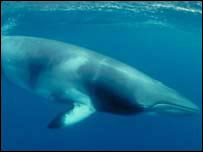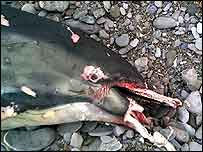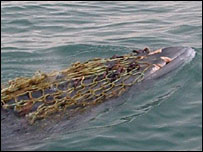|
Search for whale is abandoned
BBC NEWS
9th August 2003
Rescuers are hoping to spot stricken whale from the air
Marine experts have called off their final aerial search for a Minke whale caught up in a fishing net off the coast of west Wales.
Gwyndaf Williams, the pilot of the twin-engine Piper Seneca chartered in an effort to locate and rescue the stricken mammal took to the air on Saturday and flew for three hours over 200 sq miles.
But none of the crew saw anything, and now the search has been called off.
The crew have had numerous setbacks throughout the week because of fog caused by the hot weather.
Visibility was seriously hampered on several occasions when the crew hoped to try and spot the small whale, which was thought to be about five miles off the coast between Cardigan Bay and Aberaeron.
But on Saturday, flying conditions were described as "excellent", with perfect viewing conditions.
Flying at 500m above the see, the crew members were
able to make out porpoises in the water and even small
pieces of rubbish like plastic bags, but the whale was
nowhere to be seen.
Dolphins like this can suffer horrific injuries
"If it had been on the surface in the area we searched we
would have seen it easily," Mr Williams said.
Attempts to reach the whale and take it to safety began more than a week ago, but there has not been a confirmed sighting since Tuesday.
Marine experts feared the whale animal was facing a slow death from starvation and exhaustion.
It is thought the whale may have swallowed part of the net in which it is caught. Thousands of whales, dolphins, and porpoises are washed up on beaches every year in similar conditions.
Environmentalists, led by the Wildlife Trusts, have been campaigning for changes in commercial fishing practices to prevent such tragedies, known as by-catch deaths.
The animals often follow shoals of fish caught by trawlers and get tangled in the vast nets.
Their injuries are often so severe that they bleed to death.
The whale could have swallowed part of the fishing net
Eye-witnesses have said the Cardigan Bay whale appears
to be very thin and may have been unable to feed.
Mark Simmonds, science director of the Whale and Dolphin Conservation Society, said: "It can often be difficult to find an individual animal from a boat.
"Only a small proportion of the body can be seen from such a low platform and as there is such a vast area of sea to cover."
Adult Minke whales are usually between seven and 10m long and can weigh up to 10 tonnes when fully grown.
These are just one of over 20 different species of whales, dolphins and porpoises - known collectively as cetaceans - which are found in UK waters.
Top
|


